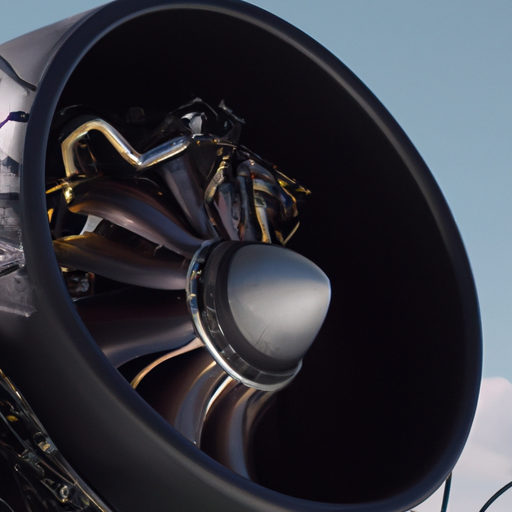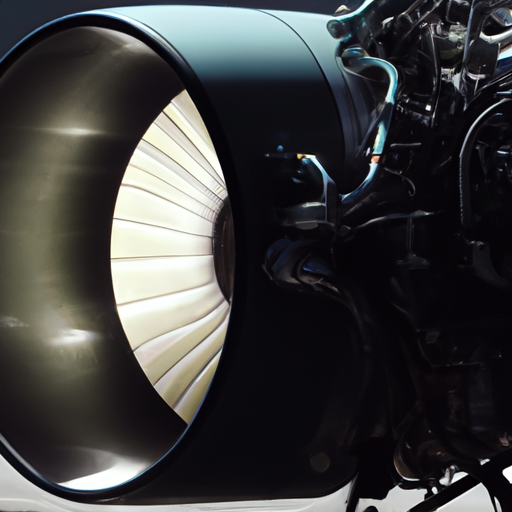
Benefits of Compact Gas Turbines in Hybrid-Electric Aviation
Rolls-Royce, the renowned British engineering company, has recently announced that it is embarking on a new phase of testing for its compact gas turbine engine designed for hybrid-electric aviation. This exciting development has the potential to revolutionize the aviation industry by offering numerous benefits that could transform the way we fly.
One of the key advantages of compact gas turbines in hybrid-electric aviation is their ability to provide a more sustainable and environmentally friendly alternative to traditional jet engines. By incorporating electric propulsion systems, these turbines can significantly reduce carbon emissions and noise pollution. This is a crucial step towards achieving the industry’s goal of achieving net-zero carbon emissions by 2050.
Furthermore, compact gas turbines offer increased efficiency compared to conventional engines. Their smaller size and lighter weight allow for improved fuel consumption, resulting in reduced operating costs for airlines. This, in turn, could lead to more affordable air travel for passengers, making it accessible to a wider range of people.
Another benefit of compact gas turbines is their versatility. These engines can be used in a variety of aircraft, from small regional planes to larger commercial jets. This flexibility allows for greater adaptability in the aviation industry, catering to different needs and requirements. It also opens up possibilities for the development of new aircraft designs that are more efficient and environmentally friendly.
In addition to their versatility, compact gas turbines offer enhanced safety features. The incorporation of electric propulsion systems provides redundancy, ensuring that the aircraft can continue to operate even if one engine fails. This is a significant improvement in terms of safety and reliability, giving passengers and crew peace of mind during their flights.
Moreover, the compact size of these turbines allows for easier integration into existing aircraft designs. This means that airlines can retrofit their current fleets with hybrid-electric systems, reducing the need for costly and time-consuming modifications. This is a major advantage for airlines looking to transition towards more sustainable operations without having to invest in entirely new aircraft.
Furthermore, the development of compact gas turbines for hybrid-electric aviation has the potential to create new job opportunities and drive economic growth. As the demand for these engines increases, there will be a need for skilled workers to manufacture, install, and maintain them. This could lead to the creation of new jobs in the aviation industry and related sectors, boosting local economies and driving innovation.
In conclusion, the testing of compact gas turbines for hybrid-electric aviation by Rolls-Royce marks an exciting milestone in the quest for more sustainable and efficient air travel. The numerous benefits offered by these engines, including reduced carbon emissions, improved fuel efficiency, enhanced safety features, and versatility, have the potential to transform the aviation industry. With the potential for job creation and economic growth, this development is not only good news for the environment but also for the industry and passengers alike. As we look towards a greener future, compact gas turbines are set to play a vital role in shaping the aviation industry of tomorrow.
Challenges and Opportunities in Testing Compact Gas Turbines for Aviation

Rolls-Royce, the renowned British engineering company, has recently announced the initiation of testing for a compact gas turbine designed specifically for hybrid-electric aviation. This groundbreaking development marks a significant step forward in the quest for more sustainable and efficient aircraft propulsion systems. However, as with any new technology, there are both challenges and opportunities that lie ahead in the testing phase.
One of the main challenges in testing compact gas turbines for aviation is ensuring their reliability and safety. The aviation industry has stringent regulations and standards in place to guarantee the safety of passengers and crew. Therefore, it is crucial for Rolls-Royce to thoroughly test the gas turbine to ensure that it meets these rigorous requirements. This includes testing for durability, performance, and the ability to withstand extreme conditions that may be encountered during flight.
Another challenge is optimizing the efficiency of the gas turbine. Rolls-Royce aims to develop a turbine that not only reduces emissions but also maximizes fuel efficiency. This is essential for the long-term sustainability of the aviation industry, as it will help reduce its carbon footprint and dependence on fossil fuels. Achieving this goal requires extensive testing and fine-tuning of the turbine’s design and performance.
Despite these challenges, there are also numerous opportunities that arise from testing compact gas turbines for aviation. One such opportunity is the potential for significant cost savings. Hybrid-electric propulsion systems have the potential to reduce fuel consumption and maintenance costs, leading to substantial savings for airlines. Additionally, the development of more efficient and sustainable propulsion systems can help the aviation industry meet its environmental targets and contribute to a greener future.
Furthermore, testing compact gas turbines for aviation opens up possibilities for innovation and collaboration. Rolls-Royce is working closely with partners and stakeholders to ensure that the testing phase is comprehensive and successful. This collaboration allows for the exchange of ideas and expertise, fostering a culture of innovation and pushing the boundaries of what is possible in aviation technology.
In conclusion, the testing of compact gas turbines for hybrid-electric aviation presents both challenges and opportunities. Rolls-Royce is at the forefront of this exciting development, aiming to create a turbine that is reliable, efficient, and environmentally friendly. The testing phase will be crucial in ensuring the safety and performance of the turbine, as well as optimizing its efficiency. However, the potential benefits, such as cost savings and a greener future for aviation, make this endeavor worthwhile. Through collaboration and innovation, Rolls-Royce is paving the way for a new era of sustainable aviation.
Future Implications of Rolls-Royce’s Hybrid-Electric Aviation Testing
Rolls-Royce, the renowned British engineering company, has recently announced that it is embarking on a new and exciting venture in the world of aviation. The company has initiated testing of a compact gas turbine for hybrid-electric aviation, a move that could have significant implications for the future of air travel.
This groundbreaking development comes at a time when the aviation industry is increasingly looking for ways to reduce its carbon footprint and become more environmentally friendly. With concerns about climate change and the impact of air travel on the environment growing, the need for innovative solutions has never been greater.
Rolls-Royce’s compact gas turbine is designed to be used as a power generator for electric propulsion systems in aircraft. By combining the benefits of both gas turbine and electric propulsion technologies, this hybrid-electric system has the potential to revolutionize the way we think about aviation.
One of the key advantages of this new technology is its ability to significantly reduce fuel consumption and emissions. The gas turbine acts as a range extender, providing power to the electric propulsion system and allowing the aircraft to fly for longer distances. This means that airlines can reduce their reliance on traditional jet fuel, resulting in lower carbon emissions and a more sustainable form of air travel.
In addition to its environmental benefits, the compact gas turbine also offers improved performance and efficiency. The system is designed to be lightweight and compact, making it ideal for use in smaller aircraft. This opens up new possibilities for regional and short-haul flights, where electric propulsion systems have the potential to be particularly effective.
Furthermore, the hybrid-electric system offers increased flexibility and reliability. The gas turbine can be used to charge the aircraft’s batteries during flight, ensuring a constant and reliable power supply. This eliminates the need for large and heavy battery packs, which can be a significant limitation for electric aircraft.
Rolls-Royce’s testing of the compact gas turbine is a significant step forward in the development of hybrid-electric aviation. The company has already conducted successful ground tests, and is now moving on to flight testing to further validate the technology. This marks an important milestone in the journey towards a more sustainable and efficient aviation industry.
The implications of this testing are far-reaching. If successful, the compact gas turbine could pave the way for a new era of hybrid-electric aircraft, with the potential to transform the way we travel. Not only could this technology help to reduce the environmental impact of air travel, but it could also open up new possibilities for regional and short-haul flights, making air travel more accessible and affordable for a wider range of people.
In conclusion, Rolls-Royce’s initiation of testing for a compact gas turbine for hybrid-electric aviation is an exciting development with significant implications for the future of air travel. This innovative technology has the potential to reduce fuel consumption and emissions, improve performance and efficiency, and increase flexibility and reliability. As the aviation industry continues to seek sustainable solutions, the success of this testing could mark a major milestone in the journey towards a more environmentally friendly and efficient form of air travel.

